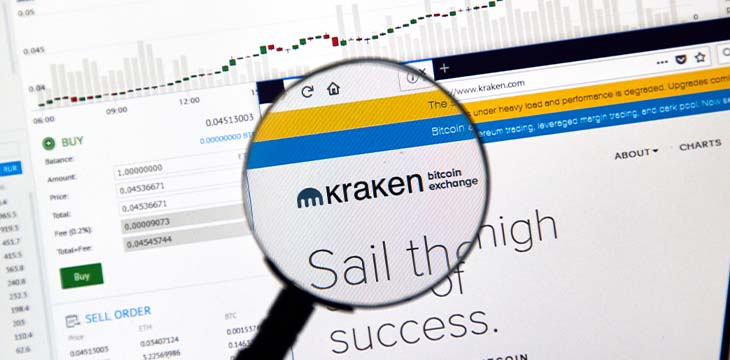|
Getting your Trinity Audio player ready...
|
Digital asset exchange Kraken will pay $362,158.70 and invest a further $100,000 in sanctions compliance controls for violating sanctions against Iran, according to the terms of a settlement agreement reached with the U.S. Treasury’s Office of Foreign Assets Control (OFAC) on Monday.
The settlement relates to 826 transactions worth $1,680,577.10 which were processed by Kraken on behalf of individuals located in Iran, which has been subject to U.S. sanctions since 1987. Kraken apparently had some geolocation tracking in place which would stop users based in Iran from signing up for an account, but did not implement any such controls with respect to subsequent transactions.
If it sounds like Kraken got off light, they did: the maximum penalty OFAC could have imposed was $272,228,964. However, despite the lack of transaction controls, OFAC cited a number of factors which it said mitigated the cryptocurrency exchange’s liability:
- Kraken had not committed any violations in the preceding five years
- It was Kraken who discovered the violations and Kraken who voluntarily disclosed them to OFAC
- Kraken undertook ‘significant’ remedial measures following the violations, including:
- Adding the geo-blocking required to prevent customers in prohibited jurisdictions from accessing their account
- Implementing blockchain analytics tools to assist with sanctions monitoring
- Investing in additional compliance training for staff
- Hiring a dedicated head of sanctions to direct Kraken’s sanctions compliance program, as well as hiring new sanctions compliance staff
- Expanding its contract with its current screening provider and adding additional screening capabilities to comply with OFAC’s 50 percent rule, which deems any entity at least 50% owned by a sanctioned individual to also be sanctioned
- Contracting with a vendor to assist with ID and nationality verification using AI tools
- Implementing an automated control to block accounts using cities and postal codes associated with Crimea, Donetsk and Luansk in Ukraine.
As a result, OFAC saw fit to accept a settlement of just $362,158.70—a fairly significant reprieve for Kraken given the scale of the violations and the penalty that OFAC was entitled to impose.
Binance does it better
For others in the industry, the news will be taken warily. Kraken seems to have gone to great lengths to act in good faith once it had realized the extent of its sanctions oversight, self-disclosing the suspected violations to OFAC and drawing their attention in the first place. But it seems certain that sanctions violations are taking place on digital asset exchanges across the board.
And for Binance in particular, Kraken’s case will be seen as a troubling starting point for their own inevitable sanctions case. A report by Reuters at the start of November, subsequently buried by the on-going FTX collapse, revealed that Binance is also engaged in widespread sanctions violations—but on a scale far beyond that of Kraken. According to data scraped from the blockchain, Binance has processed a staggering $8 billion worth of Iranian transactions since 2018, most of which flowed to a single exchange. That exchange, Nobitex, even offers tips on its website for circumventing sanctions.
Just last year, Binance was being used by two other Iranian exchanges, Wallex and Sarmayex, to traffic digital assets in violation of the sanctions, moving at least $29 million worth of assets using the platform.
Binance has made a show of responding to the revelations with denials. The exchange announced in August 2021 that it would no longer serve clients who hadn’t submitted identification. In July of this year, after Reuters reported that Binance was still serving Iranian clients, CEO Changpeng Zhao said that “Binance banned Iranian users after sanctions, 7 got missed/found a workaround, they were banned later anyways.” The next month, Binance announced that customers would no longer be able to use the exchange without providing identification.
According to the Reuters investigation, since the August 2021 announcement Binance has processed nearly $1.05 billion directly from Iranian exchanges and since Zhao’s July tweet, they’ve processed at least $80 million.
If Kraken just agreed a $362,000 settlement with OFAC for a relatively paltry $1.6 million worth of sanctions violations, what is going to happen to Binance, who have not only been caught out processing $8 billion worth of Iranian transactions but have (we can assume) failed to self-disclose these to the authorities and have continued to process illegal transactions long after it admitted becoming aware of potential sanctioned activity way back in 2021?
For starters, each violation of the sanctions against Iran carries a maximum fine of twice the amount of the relevant transaction, putting Binance’s potential liability. What’s more, any individual who wilfully aids or abets the commission of a violation under the Sanctions can be imprisoned for up to 20 years.
Follow CoinGeek’s Crypto Crime Cartel series, which delves into the stream of groups—from BitMEX to Binance, Bitcoin.com, Blockstream, ShapeShift, Coinbase, Ripple,
Ethereum, FTX and Tether—who have co-opted the digital asset revolution and turned the industry into a minefield for naïve (and even experienced) players in the market.
Recommended for you
British lawmakers of the parliamentary national security committee have called for a temporary ban on political parties receiving donations in
Circle (NASDAQ: CRCL) soared in 2025 thanks to U.S. ‘regulatory clarity,’ but can this momentum survive a ban on crypto

 02-27-2026
02-27-2026 




